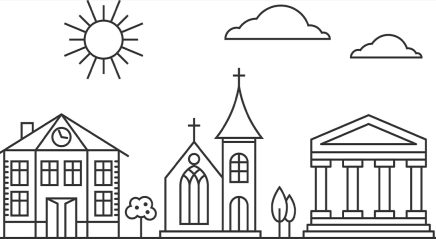Series editor’s note: In 2025, “Deeper understandings” is focusing on the ELCA social statements. We hope to reintroduce them to readers as a means of provoking fruitful, enriching conversation between Christians with different understandings and convictions, and as a springboard for active discipleship in the world. Each article will introduce a particular statement and its Lutheran theological underpinnings, then suggest ways in which it can spark faithful conversation and action in the service of your baptismal vocation.
My hope is that you will find this series relevant to your current context and that it will help you express your Lutheran faith in your daily interaction with family, friends, neighbors and co-workers—for the sake of the flourishing of the gospel of Jesus Christ in the world and the life abundant of the neighbor and stranger.
—Kristin Johnston Largen, president of Wartburg Theological Seminary, Dubuque, Iowa, on behalf of the ELCA’s seminaries
Revisiting “Caring for Health: Our Shared Endeavor,” the 2003 ELCA social statement on health, healing and health care, is a remarkable experience. It discusses health in broad terms and calls for justice, love and mutual care. In very Lutheran language, it reminds its readers of the important vocation of health care providers.
The statement expresses both urgency and hope in laying out a clear theological framework to support the pursuit of health for every member of the beloved community. In retrospect, it seems prophetic: now that COVID-19 is widely regarded as a manageable illness and we are arguably post-pandemic, we can see even more clearly how important and incisive this statement was.
The social statement argues that upholding each other’s health is an essential aspect of living out our Christian vocation.
Since “Caring for Health” was published in 2003, I have welcomed my second child and sought care for both my children as they grew into adulthood, including both routine and urgent, lifesaving care. I have struggled with yearslong impairment and disability and received life-enhancing medical services from skilled physicians, nurses, physical therapists and other care providers.
I have witnessed my parents and other beloved family members experiencing the changes that come with aging and have been grateful for the many professionals who have helped them preserve and maintain their health.
Many of my students have followed their vocations to become health care providers. Many others have sought accommodations for their disabilities, including ongoing physical and mental health support, as they pursued higher education.
As Christians, we’re called to love one another, and the social statement argues that upholding each other’s health is an essential aspect of living out our Christian vocation as neighbors. This means supporting health care providers and health care access, ensuring the availability of affordable and healthy food, educating children about their health, getting sufficient exercise and sleep, recognizing the value and limits of end-of-life care, and ensuring that our health information is data-driven and that our public and personal health care decisions are made as wisely as possible.
Because we are sinners, we struggle with many of these things. Yet God calls us, individually and as a church, to love our neighbors and ourselves, including in the domain of our health.
A vital call
Many of the individual problems and issues identified by “Caring for Health” have become more critical in the 20-plus years since the statement was adopted by the ELCA. The cost of educating health care providers, like the cost of education generally, has outpaced wages; many students and their families struggle to afford this education.
The statement points out that health insurance is not equally available to all members of the community: “Currently, despite programs to provide at least some care for the poorest among us, the percentage of people with health insurance is lower as income declines” (19). Subsequent legislation—including the 2009 Affordable Care Act—aimed to address this problem, but the goal of affordable, accessible health care for all people in the United States has not remained a political priority. In recent years, the availability of health care services has declined in many rural areas, which has left communities without the care their members need.
“Caring for Health” is frank in its critique of the economic systems that widen the divide between rich and poor and leave people without the tools and services they need to maintain the good health of their bodies and minds: “Justice requires giving to each person his or her due. Health care is the kind of good most appropriately given on the basis of need. Too often, however, health care is distributed on the basis of merit, social worth or contribution, marketplace value, or ability to pay” (18).
The statement points out that health insurance is not equally available to all members of the community.
The statement also speaks eloquently to the fact of human finitude: We will not live forever, and during our lifetimes, we struggle with our limited power and abilities. “Caring for Health” specifically names disability as an aspect of human experience that may occur even when people faithfully steward their own and others’ health. It affirms health as a blessing from God while firmly rejecting the idea that illness is an avenue through which God expresses punishment or anger. There is tension here between affirming the goodness of our created bodies and recognizing that God made our bodies and minds finite.
In 2003, I could not have predicted how many of my life experiences, big and small, would be described in the statement. Our collective experience of the COVID-19 pandemic, which is ongoing for many people even now, illustrates the ways in which we can love our neighbors through our everyday actions.
Our shared experiences of struggling with physical, social and spiritual health in the difficult days of 2020 and 2021 illustrate the urgency of data-driven medical decisions, compassion for our neighbors and cultivating care for others as part of our Christian vocation to love one another. It was, at times, heartening to share this collective responsibility and, at times, distressing to realize our vulnerability and lack of mutual care. The call to love our neighbors remains vital.
As the statement reminds us, “Achieving these obligations of love and justice requires sacrifice, goodwill, fairness, and an abiding commitment to place personal and social responsibilities of love and justice above narrower individual, institutional, and political self-interests” (20).
Get this column in your inbox: Visit livinglutheran.org/create-account and sign up for the free email digest LL Stories. Receive the digest weekly, biweekly or monthly, and select the categories that interest you. (“Deeper understandings” is a “Theology & Beliefs” column.)







